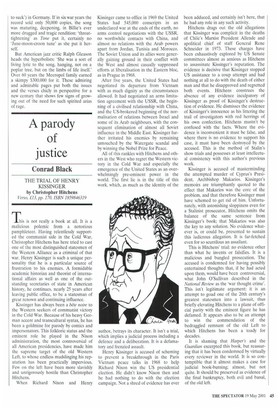A parody of justice
Conrad Black
THE TRIAL OF HENRY KISSINGER by Christopher Hitchens Verso, £13, pp. 170, ISBN 1859846319 his is not really a book at all. It is a malicious polemic from a notorious pamphleteer. Having relentlessly supported the communist side in the Cold War, Christopher Hitchens has here tried to cast one of the most distinguished statesmen of the Western Alliance as a criminal of that war. Henry Kissinger is such a unique personality that he is a particular source of frustration to his enemies. A formidable academic historian and theorist of international affairs as well as one of the outstanding secretaries of state in American history, he continues. nearly 25 years after leaving public office, to be a statesman of great renown and continuing influence.
Kissinger has always been a bete noire to the Western seekers of communist victory in the Cold War. Because of his heavy German accent and transcultural syntax, he has been a goldmine for parody by comics and impersonators. This folkloric status and the eminent role he played in the Nixon administration, the most controversial of all American presidencies, have made him the supreme target of the old Western Left, to whose endless mudslinging his reputation has been practically impervious. Few on the left have been more slavishly and unrigorously hostile than Christopher Hitchens.
When Richard Nixon and Henry Kissinger came to office in 1969 the United States had 545,000 conscripts in an undeclared war at the ends of the earth, no arms control negotiations with the USSR, no worthwhile contacts with China, and almost no relations with the Arab powers apart from Jordan, Tunisia and Morocco. The Soviet Union and its allies were generally gaining ground in their conflict with the West and almost casually suppressed efforts at liberalisation in the Eastern bloc, as in Prague in 1968.
After five years, the United States had negotiated its departure from Vietnam with as much dignity as the circumstances allowed. It had negotiated an arms limitation agreement with the USSR, the beginning of a civilised relationship with China, and the US-brokered beginning of the normalisation of relations between Israel and some of its Arab neighbours, with the consequent elimination of almost all Soviet influence in the Middle East. Kissinger further irritated his enemies by remaining untouched by the Watergate scandal and by winning the Nobel Prize for Peace.
All of this rankles with Hitchens and others in the West who regret the Western victory in the Cold War and especially the emergence of the United States as an overwhelmingly pre-eminent power in the world. The first lie is in the title of this work, which, as much as the identity of the author, betrays its character. It isn't a trial, which implies a judicial process including a defence and a deliberation. It is a defamatory and frenzied assault.
Henry Kissinger is accused of scheming to prevent a breakthrough in the Paris Vietnam peace talks in 1968 to help Richard Nixon win the US presidential election. He didn't know Nixon then and he had nothing to do with the election campaign. Not a shred of evidence has ever been adduced, and certainly isn't here, that he had any role in any such activity.
Hitchens drags out the old allegations that Kissinger was complicit in the deaths of Chile's Marxist President Allende and apolitical chief of staff General Rene Schneider in 1973. These charges have been exhaustively explored by US Senate committees almost as anxious as Hitchens to assassinate Kissinger's reputation. The evidence is decisive that Kissinger stopped US assistance to a coup attempt and had nothing at all to do with the death of either man and that he disapproved and regretted both events. Hitchens construes the absence of any evidence inculpatory of Kissinger as proof of Kissinger's destruction of evidence. He dismisses the evidence of Kissinger's innocence as his littering the trail of investigators with red herrings of his own confection. Hitchens mustn't be confused with the facts. Where the evidence is inconvenient it must be false, and where there is no evidence to support his case, it must have been destroyed by the accused. This is the method of Stalin's show trials and possesses at least intellectual consistency with this author's previous work.
Kissinger is accused of masterminding the attempted murder of Cyprus's President, Archbishop Makarios. Kissinger's memoirs are triumphantly quoted to the effect that Makarios was the core of the problem, and that therefore Kissinger must have schemed to get rid of him. Unfortunately, with astonishing sloppiness even for a Stalinist prosecutor, Hitchens omits the balance of the same sentence from Kissinger's book; that Makarios was also the key to any solution. No evidence whatever is, or could be, presented to sustain this ludicrous allegation. It is far-fetched even for so scurrilous an assailant.
This is Hitchens' trial: no evidence other than what he invents or falsifies. It is a malicious and bungled prosecution. The accused is condemned for having possibly entertained thoughts that, if he had acted upon them, would have been controversial, what John O'Sullivan described in the National Review as the 'war thought crime'. This isn't legitimate argument; it is an attempt to goad one of the 20th century's greatest statesmen into a lawsuit, thus briefly elevating Hitchens to a plane of official parity with the eminent figure he has defamed. It appears also to be an attempt to win the commendation of the bedraggled remnant of the old Left to which Hitchens has been a toady for decades.
It is shaming that Hipper's and the Guardian excerpted this book, but reassuring that it has been condemned by virtually every reviewer in the world. It is so contemptible that it almost makes a case for judicial book-burning; almost, but not quite. It should be preserved as evidence of the final bankruptcy, both evil and banal, of the old left.


































































 Previous page
Previous page